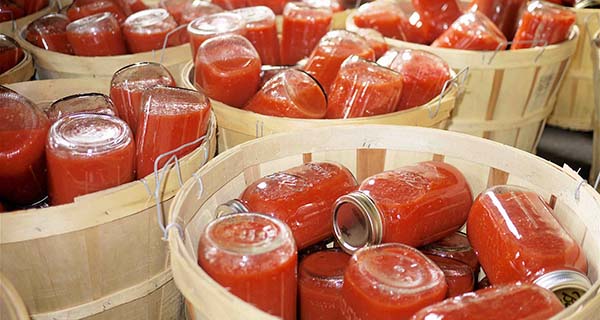
With a 3.6% increase in value to € 1.5 billion, 2014 ended positively for the tomato preserves industry. The sector also accounts for more than 15% of the national GDP and more than 10% of employment, a confirmed a strong point of Italian agriculture sector.
According to Anicav (the National Association of Industrial vegetable foods) export carries a weight of 60% of total turnover in the sector. The most requested product in general, with 2 million tons exported, is the peeled tomatoes, whole or in pieces, while the passata is particularly popular abroad, and saw sales increase by more than 22% in a year; tomato paste has increased especially in Russia (+ 47%) and Belgium (+ 30%).
Also in the first quarter of 2015, export performance remained positive: the processing industry of vegetables showed an increase of 7.2% in value and 5.6% in volume, while the industry of fruit processing increased 1.2% in sales and fell by 3.0% in quantity. Tomato preserves and peeled tomatoes, in particular, closed the first quarter up by 7.5% in value and 5.5% in volume.
“Despite the increase in imports – said Antonio Ferraioli, president of Anicav – essentially due to the increase of imports of tomato concentrate from non EU countries, which is intended mainly for re-export, the data in the sector in the first quarter of year is positive. Exports of tomato and vegetable preserves show an increase both in value and volume. Therefore, the net balance between imports and exports increased compared to the same quarter of 2014.”
The positive trend is further confirmation that the Italian products continue to be popular abroad, and that the international demand for Made in Italy food continues to grow. Yet, in terms of exports more could be done. “The food exports – notes Ferraioli – is still a small part compared to the total turnover of the sector if we compare it to countries like France and Germany, mainly because of the small size of Italian companies and the lack of distribution chains abroad. Therefore it is strategic to join forces to push the promotion of those elements that are at the base of our excellence: quality, tradition, the close relationship between product and territory, in one word typicality.”
According to Ferraioli, the Made in Italy experience must be used in the world and visibility has to be further strengthened through serious international marketing policies, carried out by the Government. The support of the organizations is also fundamental. Ice, for example has helped to target foreign markets and target countries, with exhibitions and ‘incoming’ visits, direct promotion and relations between our companies and foreign importers and importers.
